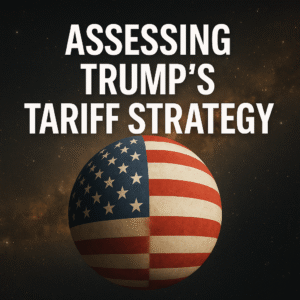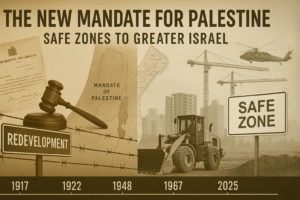Geopolitical Briefing: Iraq
— 31 August 2025
- Baghdad pulled the draft law restructuring the Popular Mobilization Forces (PMF) from parliament on 27 August amid visible external pressure and coalition rifts. (The National News, rudaw.net, شفق نيوز, ReliefWeb)
- The Cabinet on 26 August approved principles of an energy-sector cooperation framework with Siemens Energy to stabilize the grid and cut outages. (Reuters, CNBC Arabia)
- Iraq launched its first national five-year plan on migration (2025–2030) on 27 August, positioning mobility policy as a lever for stability and development. (The United Nations in Iraq)
- Al-Sudani told Turkish firms on 31 August that Iraq–Türkiye trade has surpassed $20 billion and tied it to opportunities from the Development Road. (The Peninsula Newspaper, QNA)
- Tensions with Erbil resurfaced as Baghdad conditioned Kurdistan Region salary releases on revenue transfers, drawing public rebukes from the Iraqi Parliament’s deputy speaker. (شفق نيوز)
Baghdad’s decision this week to withdraw the PMF restructuring bill—after two readings and months of acrimony—signals a tactical pause in formalizing militia prerogatives that would have entrenched Iran-aligned formations inside the state’s security architecture. Reporting in Baghdad attributes the move to intense U.S. and Western objections, even as Shia factions remain divided on the bill’s contents. In the short term, shelving the law eases external pressure and avoids new sanctions exposure; strategically, it postpones a foundational choice over command-and-control in Iraq’s armed ecosystem. The retreat reduces the risk of hard-coding parallel chains of command but also highlights how non-Iraqi actors can still shape Baghdad’s security legislation—an ambivalent outcome for sovereign security stewardship and the effort to insulate decision-making from outside leverage. (The National News, rudaw.net, شفق نيوز, ReliefWeb)
On the economic-security seam, the Cabinet’s 26 August approval of principles for a cooperation framework with Siemens Energy is a practical step to fortify baseload generation, modernize transmission, and lower the frequency of cascading blackouts that have dogged Iraq each summer. While details remain sparse, Siemens has been embedded in Iraq’s power sector since 2019 and is positioned to accelerate maintenance and network upgrades—complementing gas-capture and solar build-outs with other partners. If implemented with fiscal discipline, the framework can incrementally trim reliance on imported Iranian gas and give Baghdad greater latitude in energy diplomacy, lifting a structural vulnerability that external actors have routinely exploited. (Reuters, CNBC Arabia)
Iraq also unveiled its first National Plan to Promote Safe, Orderly and Regular Migration (2025–2030). Framed by UN agencies as a “historic step,” the plan codifies institutional coordination, data-driven policy, and private-sector engagement to manage outward and inward flows, including over 370,000 migrant workers in-country and a sizeable diaspora. Better migration governance can reduce human-security shocks, harness remittances, and align labor markets with reconstruction needs—strengthening state capacity and societal cohesion. By treating mobility as a development asset rather than a pressure valve, Baghdad nudges policy away from ad-hoc external fixes and toward domestically anchored planning consistent with its broader sovereignty agenda. (The United Nations in Iraq)
Regionally, Prime Minister Mohammed Shia’ al-Sudani told a visiting delegation of Turkish business leaders that Iraq–Türkiye trade has now exceeded $20 billion, linking the momentum to forthcoming opportunities from the Development Road corridor and to ongoing water-file coordination. Ankara remains central to Iraq’s logistics geometry (ports–rail–highways and the long-stalled Ceyhan oil corridor), and deepening trade interdependence with a powerful Muslim neighbor diversifies partnerships beyond Western finance and curbs over-exposure to U.S. transactional politics. If Baghdad leverages customs harmonization and corridor financing without conceding resource or border equities, closer Ankara ties can underwrite growth while buttressing strategic autonomy from non-regional arbiters. (The Peninsula Newspaper, QNA)
Domestically, the center-periphery fiscal tug-of-war re-emerged as Kurdistan Region salary disbursements were again conditioned on revenue transfers and oil-throughput commitments to federal channels. The latest week saw Erbil deposit non-oil revenues while denouncing Baghdad’s delays; the cabinet’s 26 August guidance on salary releases kept the conditionality architecture intact. Continued linkage of payrolls to federal integration aims to unify the public-finance space and assert single-channel hydrocarbon governance. Done transparently, it can strengthen Baghdad’s control over rents and borders—key to insulating national policy from foreign political instruments—but if mishandled risks fueling intra-Iraqi fragmentation that external actors can weaponize. (شفق نيوز)
In sum, this week’s moves present a coherent, if uneven, pattern: pausing militia-empowering legislation under pressure; hedging energy dependence through European technical partnerships; codifying migration management; and scaling a trade lane with Türkiye. Each track, if carried through with institutional discipline and regional balancing that privileges Muslim-world partnerships, incrementally shifts Iraq toward firmer control of its security levers, a more independent economic footing, and reduced space for pro-Israel alignments to shape Baghdad’s calculus. The test will be sustaining these shifts without swapping one form of external tutelage for another, particularly as sanctions dynamics on Iran and oil-export politics with Ankara continue to buffet Baghdad’s choices. (The National News, Reuters, The United Nations in Iraq, The Peninsula Newspaper)


